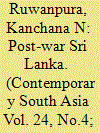| Srl | Item |
| 1 |
ID:
167247


|
|
|
|
|
| Summary/Abstract |
Sri Lankan apparel factories claim to be at the vanguard of ethical production on the global supply chain. Both to produce this image and to project their status as fair employers, industrialists offer health services at factory settings. This article focuses on two factory sites that have permanent qualified nurses to attend to illness and injuries, and medical doctors that visit twice a week. While on the face of it, these efforts are commendable, what my fieldwork signalled was that occupational health issues were inseparable from the creeping privatization of health care systems. Injuries or illnesses not treated within a ‘reasonable’ time frame were invariably referred to the private clinics of medical doctors. Ironically, this pattern is bolstered by the proliferation of what one worker described as ‘imaginary’ illnesses – that is, illnesses that workers concoct as a form of respite from the intense pressures of working in this sector. In this paper, I examine the ways in which workers get treated and how it is connected to an increasingly unregulated privatized landscape of healthcare. These shifts also show how the perspectives of citizenry change, despite the social welfare achievements around health and longevity of Sri Lankans.
|
|
|
|
|
|
|
|
|
|
|
|
|
|
|
|
| 2 |
ID:
151238


|
|
|
|
|
| Summary/Abstract |
Sri Lanka has been through vicissitudes of change in the past three decades and its current political order gives the impression of the possibility for a different vision for Sri Lanka. Yet in order to appreciate the continuities and disruptions to Sri Lanka’s polity and the possibility of a politics of reconciliation, the contributors to this special issue argue that we also need to redirect our attention away from the state. It is an initial call that seeks to disentangle the ways in which the various constituents that make up the state, including capital and labour, are also implicated or suffer from a tragic perpetuation of an ethno-nationalist agenda that keeps morphing into various guises at fraught moments. A politics of reconciliation then, it suggests, cannot simply be limited to a political package that does not recognize the very economic disempowerment of large segments of people. The contributors to this special issue come from varying disciplines and adopt a range of methods to explore how this politics of reconciliation is understood, endorsed and contested in the everyday lives of Sri Lankan people.
|
|
|
|
|
|
|
|
|
|
|
|
|
|
|
|